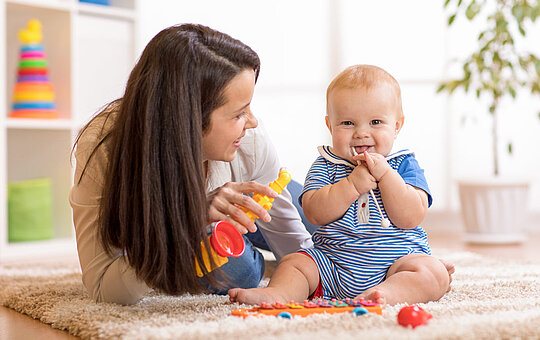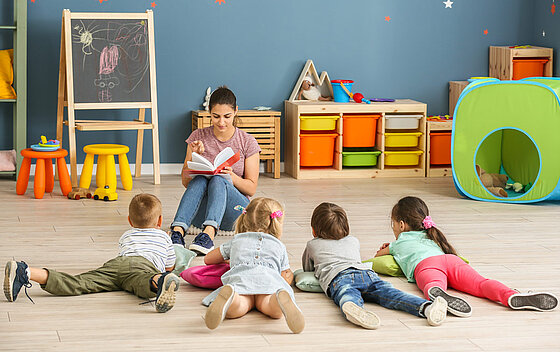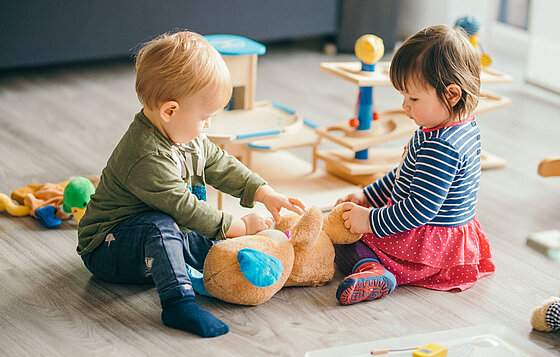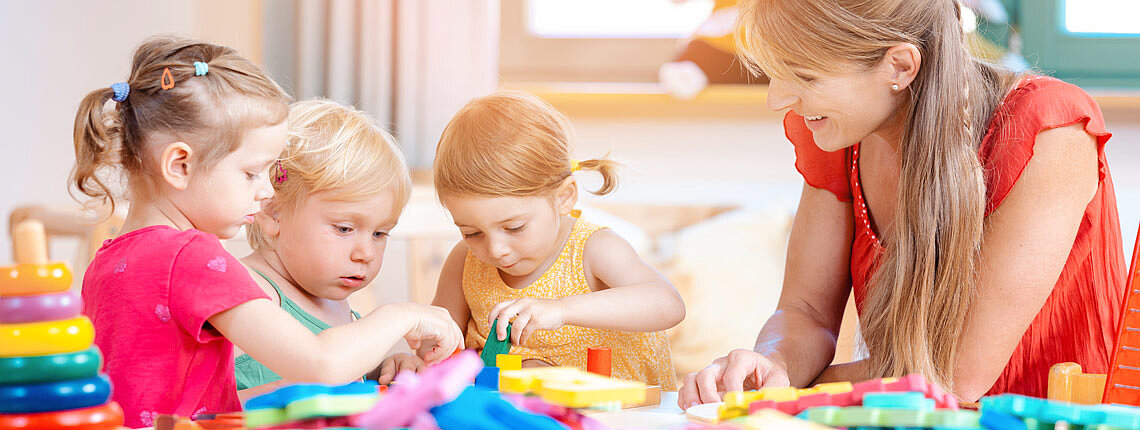Nursery
Nursery
The first three years of life are a magical time that prepares children for the rest of their lives. Each child develops a feeling of autonomy. Therefore, it is imperative to treat every child as an individual and provide the opportunity for self-determined actions.
Infants and Toddlers (2-24 months)
Every parent knows the loud and assertive "No" of a toddler. Eventually, this "No" leads to a "Yes" that is a result of free will. The child develops control over its body and its emotions. Only if children realize that they can influence things and actions, they are ready for the next developmental step: They get aware of their capabilities and realize that they can achieve things. Therefore, young children become active learners and problem solvers, who discover the world around them.
The first three years of life are the most important for the development of the human brain. In these early time of life essential language skills are acquired. Experiences play a vital role in creating links within the brain that are the basis for future intellectual and emotional development.
From birth infants are excellent learners, the examine visual impressions as well as sounds and feel their environment. Little Giants provides babies and young children with a safe environment, which is full of opportunities for active exploration and fun. Children can see, touch, feel and move things. Young children need an environment that is responds with interactions and language.Our caregivers involve babies in regular conversation. They read books, sing songs and respond to the sounds and words of the child. Thus, babies get acquainted with language as a primary means of communication.


Individualized Care
Affectionate Care


Reading
Long before understanding words and pictures, infants profit from a book being read to them. At this early age, children get prepared for learning to read. Sitting on a lap or on the floor or when going to sleep, babies become familiar with the magic of books and stories.

A Place To Grow
Infants discover our world with all senses and their motor skills. Long before a child understands words like "under" and "distant", they learn to move: climb up and down, crawl under tables or over obstacles. Our rooms offer a rich learning environment with learning centres that focus on maximizing learning experiences:
Sensory experiences
At Little Giants children discover different textures, colors, patterns, shapes, smells, tastes and weights.
Self-expression
Art, movement, imitation, first dramatic play and games with dolls and stuffed animals.
SENSORY IMPRESSIONS
With Little Giants, children discover surface textures, colors, patterns, shapes, smell, taste and weight.
Language and music
Communication and language take up a major part of a day at Little Giants. We do reading and language games and discover music, rhymes and sounds.
What babies and toddlers learn at Little Giants
Our curriculum is designed to support the development of each child at its own individual pace. We regard care and learning as an inseparable unit. We help children do develop their physical, motor, sensory, cognitive and social skills.
Parents' importance
Our caregivers know, that the relationship between parents and their child is most important. Therefore, parents can visit their child at any time of day. We welcome any ideas and suggestions. Strong parent involvements helps us to continuously improve our services.
cognitive experiences
Children discover object permanence and spatial relation classification. Collecting and dumping, they learn to classify objects. In simple experiments we demonstrate the principles of cause and effect and train problem solving skills.
Two-year-old Children
The world of twos reflects the transitional nature of the third year of life. Our program is designed two facilitate the transition from the sensory-motor world of a one-year-old to an increasingly social world.
Communication skills, determination, the quest for independence and the control over bodily functions rapidly develop in twos.
The transitional nature of experiences a two-year-old child makes can only compared to those of an adolescent person. Just like adolescence is the transition from childhood to adulthood, the transition of a two-year-old is one from the total independence of an infant two a much more independent and mobile world. For both the teenager and the two-year-old these times are sometimes rather frustrating. It is characteristic for two-year-olds that their moods are constantly changing and that they are unsure about what the want to do. Quite often the desire and the imagination of a child exceed its abilities This is why two-year-olds need challenges they can master and experiences that train their skills.
A relaxed atmosphere makes is easier to deal with constant mood changes and irrational behavior. Especially twos need caregivers, who help them while they are learning, who accept their inconsistency and who set necessary limits in a very calm and consistent manner.
The learning environment of twos consists of both learning centres and a creative curriculum. Well planned learning centres support the curriculum and allow children to make their own choices. Language development, mathematical and scientific thinking is emphasized in all Little Giants Early Learning Centres. The learning environment is constantly changed to meet emerging interests and individual goals. Our learning centres offer guided experiences that foster the development of skills and knowledge.
Typical learning centres are:
- Books
- Blocks
- Household / Dramatic Play
- Art
- Sensory experiences /Sand and Water
- Physical activities
- Discovery / Science
- Outdoor activities
- Music
- Tabletop toys: Puzzles, etc
Learning centres are complemented by learning activities for that are designed for one or two children.
During the day children make their own learning choices. They take part in group activities and projects. Once a day they gather for circle time and reflect their experiences. Children are encouraged to make critical learning experiences, which are important for their healthy development. Using our curriculum and the knowledge of each individual child and its family, our caregivers constantly design new learning centres that suit the interests of the children in their rooms.
The Little Giants program teaches language skills, mathematical and scientific thinking, project work, knowledge and creativity. To ensure a healthy development, physical activity and healthy are an essential part of our curriculum.
